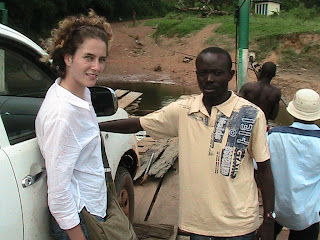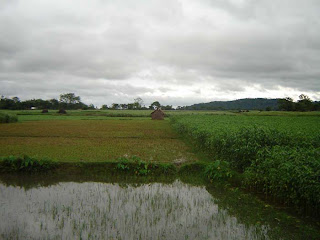Sierra Leone:
The Think Build Change Salone (TBCS) initiative seeks to help rebuild post-civil war Sierra Leone by providing ICT training to young people placed at paid internship positions with local non-profit organizations so that they may gain work experience and contribute to development projects.
In September Vickie Remoe-Doherty, of the Think Build Change Salone, described the challenges she was facing when seeking out young, capable and passionate interns from the capital city, Freetown.
Vickie was finally able to find 14 young leaders to advance the TBCS initiative and you can view their profiles here. They are being placed at various non-profit organizations around Sierra Leone. When they become comfortable with the new media tools, they will start documenting their experiences in those organizations.
The first experience was logged by Kadi Yata Kandeh (26), a third year student of Nutrition & Dietetics at Fourah Bay College with excellent academic records. Last month she posted the profile of her intern organization ‘Mano River Women’s Peace Network (MARWOPNET)’. This month she writes about her experience in the Training of Trainers Workshop at Bo titled “Engendering Conflict Early Warning and Response”. The training advocates women to participate actively and contribute substantially to peace consolidation not only in Sierra Leone but throughout the Mano River Sub-region.
She shares:
“The Workshop was a challenge for me because it was my first workshop on residential (where I had to stay over night), and on Peace Building. I was one of the reporters, so I had to be attentive to all speakers for valuable contributions.”
Read more of her experiences.

Sahr Emmanuel Joseph is a second year Economics student at Njala University. He joined as an intern in Peace and Development Corp Program, a project under National commission for social action (NaCSA). In his informative post he describes his role and experiences there. He has some advices to the potential interns and opines:
“Information and technology knowledge is actually low in the country as stated by Siera Vision President I would recommend if donors agree to fund them let the organization provides information and technology training for student in the various university by organising free citizen media workshop for student in the various university and also organising educative programme that will enhance technology capacity of the students.”
Noah Suluku is the second youngest intern at age 21. He posts some pictures of the “Children of Bay” picking through garbage.
Bangladesh:
In the second part we take a closer look at Nari Jibon’s recent blogging activities. They are arranging regular fortnightly meetings about their progress. In the last meeting on the November 10th they summarized that since the beginning they have posted 105 articles (both Bangla and English) and 32 more in the pipeline for editing.
They arranged a training program for twelve new and old bloggers (Nari Jibon students/work-study students), covering digital photography, the basics of blogging, how to write a post, what to write, etc.
We have seen more blogger profiles posted to their Bangla and English blogs. The new bloggers think that the most important part of this organization is the Nari Cybercafé where the PCs are situated and they can blog there. They discovered blogging only after coming to Nari Jibon and they are now happy and eager to share their stories to the world.
Sherin Sultana thinks that because she is from a middle class family she cannot be exceptional. She describes the limitations of being a member of a middle class family:
“We don’t have abundance of money. If our watches become useless, we change only the belt or battery and change those again and again. But we never change the dial or buy a new one. If our shoes get useless we try once again to add another sole. We can’t expect more than enough to our necessity. Our self respect is very high so we can’t want something to anybody. If we don’t have anything then we try to get those by our own ability. Our life is measured and tied by the circle of middle class.”
But she is optimistic and cherishes the values middle class lives possess: sorrows, pains, love, affection and unlimited respect.
Nina Sultana went to a slum in Dhaka and experienced their poverty and difficult life styles up close. The slum people live in a dirty environment. They are deprived of fresh food, water and good shelter. They suffer from hunger, malnutrition and different kinds of diseases. She thinks their poverty leads some of them to break laws and engage in mugging and stealing.

Hasina Akhter describes [bn] her ancestral village, Bogadia, situated in Noakhali district, which boasts of having most of the basic amenities like electricity, water, and gas.
Nari Jibon’s Dr. Kathryn B Ward posted about Justice for Nadine and Rahela, two Bangladeshi victims of domestic violence and aligned Nari Jibon blogs with the Bangladeshi blogosphere who are advocating this issue quite vocally. Finally words of concern from Dr. Ward center on the deadly Hurricane Sidr which made landfall in Bangladesh Thursday night.
Their next training will cover the operation of video cameras and digital cameras for some Nari Jibon staff members and also for some students. We expect to see more photo and video blogging from Nari Jibon bloggers soon.




2 comments
http://www.xxx.symmetricsolution.net Find Dhaka Girls